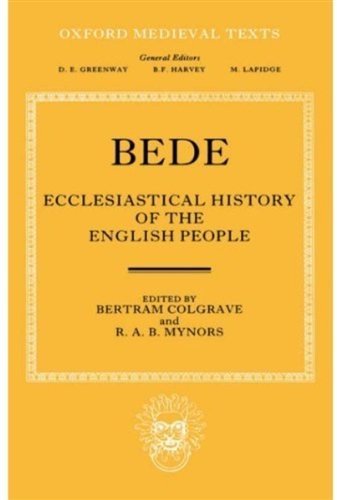Items related to The Ecclesiastical History of the English People (Oxford...

Synopsis
Book by Bede
"synopsis" may belong to another edition of this title.
From the Back Cover
Bede's Ecclesiastical History of the English People, completed in 731, is a masterpiece of historical writing. Bede's clear narrative, his scrupulous sifting of evidence and his vigorous pursuit of information from many sources written and oral are all features which commend themselves to modern readers. The work was read in every part of Europe throughout the Middle Ages, and today it still remains the best-known text to have survived from Anglo-Saxon England. From its pages we learn the stories of Edwin and Oswald, Cuthbert and Caedmon, and many more which have become an indelible part of English national consciousness. The present edition, first published in 1969, is recognized as standard and authoritative: its text is based on all the important early witnesses (including, for the first time, the 'Leningrad Bede'), and the Introduction contains Sir Roger Mynors's classic account of the work's complex manuscript transmission. A number of printer's errors has now been corrected, and marginal cross-references to discussion in J. M. Wallace-Hadrill Bede's Ecclesiastical History of the English People (Oxford Medieval Texts, 1988) have been added.
About the Author
edited by Bertram Colgrave and R A B Mynors
"About this title" may belong to another edition of this title.
- PublisherOxford University Press
- Publication date1970
- ISBN 10 0198222025
- ISBN 13 9780198222026
- BindingHardcover
- LanguageEnglish
- Number of pages694
- EditorColgrave Bertram, Mynors R. A. B.
- Rating
Shipping:
US$ 6.00
From Canada to U.S.A.
Top Search Results from the AbeBooks Marketplace
BEDE'S ECCLESIASTICAL HISTORY OF THE ENGLISH PEOPLE
Seller: Ancient World Books, Toronto, ON, Canada
Hardcover. Condition: Very Good. Dust Jacket Condition: Very Good-. Lower corners lightly bumped. DJ has chipping with a few tears. ; Reprint 1979. The most important and best known of his works is the Historia ecclesiastica gentis Anglorum, giving in five books (about 400 pages) the history of England, ecclesiastical and political, from the time of Caesar to the date of its completion (731). The first twenty-one chapters, treating of the period before the mission of Augustine, are compiled from earlier writers such as Orosius, Gildas, Prosper of Aquitaine, the letters of Pope Gregory I, and others, with the insertion of legends and traditions. After 596, documentary sources, which Bede took pains to obtain, are used, as well as oral testimony, which he employed with critical consideration of its value. He cited his references and was very concerned about sources of all his sources, which created an important historical chain. He is credited with inventing footnoting. (Due to his innovations like footnoting he was accused of heresy at the table of Bishop Wilfred, although the actual accusation was for miscalculating the age of the world, his chronology being contrary to the calculation of the time. The controversy is linked to footnoting because Bede cited another source in a note, rather than opining himself; others misunderstood the significance of citing another source). ; Oxford Medieval Texts; 696 pages. Seller Inventory # 39364
Quantity: 1 available
The Ecclesiastical History of the English People (Oxford Medieval Texts)
Seller: Toscana Books, AUSTIN, TX, U.S.A.
Hardcover. Condition: very good. Purchase pre-owned books for prompt service and customer satisfaction. Seller Inventory # UnScanned0198222025
Quantity: 1 available

